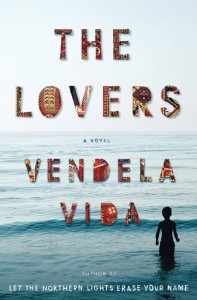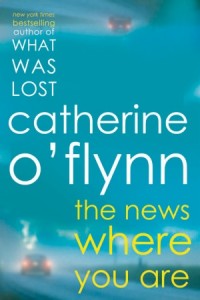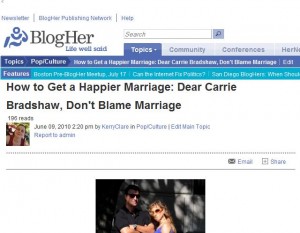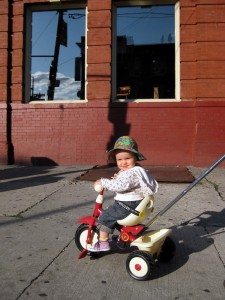June 12, 2010
Fiction on the way
I don’t read much on public transit anymore, because I’m usually carrying my daughter in the Baby Trekker and entertaining her by making faces at our reflection in the windows. But today I had a trip with two subway legs, then the streetcar, and by the end I’d had enough, lamenting that there is no Poetry on the Way these days, because I really was craving a little reading break. When I got on the subway to go home, however, I was pleased to board a car full of book ads, and one of these was a book excerpt. It was wonderful! I don’t care that it was an excerpt from Sophie Kinsella’s Twenties Girl, which is certainly not a book after my heart, but it won it a bit today anyway. As I stood there hugging a pole, going through enough text to give me a taste of a story. It was the only remotely entertaining subway ad I’d encountered all day (and I’d encountered more than a few!). A wonderful idea, and I think more marketers should do this…
June 12, 2010
Vicious Circle Reads: Shadow Tag by Louise Erdrich
 I said I’d never join a book club, mostly because I get offended by book club questions in the back of paperbacks. Or rather, I get really disturbed by the idea of somebody finishing a book, and not being able to think of any questions on their own. Which isn’t snobbery on my part– surely, the most unschooled reader would come away with the most questions anyway? And that would be a fine thing, but to finish a book and come up with nothing? What’s the point of reading, let alone clubbing to talk about it?
I said I’d never join a book club, mostly because I get offended by book club questions in the back of paperbacks. Or rather, I get really disturbed by the idea of somebody finishing a book, and not being able to think of any questions on their own. Which isn’t snobbery on my part– surely, the most unschooled reader would come away with the most questions anyway? And that would be a fine thing, but to finish a book and come up with nothing? What’s the point of reading, let alone clubbing to talk about it?
When I finish a book, I usually come away with a mess of questions, and this was why I decided to finally join a book club. I also decided to join because they asked me, and “they” was a group of people/readers I really respect (and would enjoy sitting around drinking wine with). Also because “they” were going to ask other such people, and the whole group seemed like a worthwhile one to take my questions to. To check my reader responses, to clear up what I didn’t get, it fill me in on what I’d glossed over, to provide some fine enlightenment, new perspectives, and expand my readerly horizons.
The Vicious Circle had our first official meeting this week, to discuss Louise Erdrich’s novel Shadow Tag. Someone asked me beforehand if I liked the book, and I told him that I wasn’t sure yet– perhaps the best kind of book to be under discussion. I enjoyed reading it enough, admired the writing, was appropriatly disturbed by scenes of harsh brutality, but the novel’s slightness also left me perplexed. I was unsure of its wider context. Shadow Tag is the latest novel by Erdrich, who I’ve never read before. The novel has autobiographical over/undertones, as evidenced by this rave review, and the fact that the lead character is mirrored by a character called Louise.
The lead character is Irene, who begins to keep a second diary (“the blue notebook”) when she discovers that her husband Gil has been reading her original diary (“the red notebook”, and I couldn’t help but think of Doris Lessing too, but not enough to come to any conclusion). She begins to manipulate Gil with the first diary, pushing his boundaries, and the boundaries of their relationship. Gil is a painter who has come to fame with degrading images of Irene in the context of native-American history, and she is essential to his artist persona and to his art. Irene’s entire identity is wrapped up in being Gil’s muse, so she has a lot riding on their relationship as well, in addition to the fact that Gil swore he’d use her alcoholism to take the children from her if she ever left him. Which is also to say that their children are in the middle of this, and being damaged in the cross-fire.
A twist at the end of the novel reveals a mysterious narrator and brought forth many questions about everything I’d read already. How reliable was Irene’s other diary if she was lying in the first? How reliable was the third-person perspective? Could any of the novel’s weakness in plot or character be written down to being a deliberate part of the structure? I’d enjoyed the writing, the childrens’ perspective as witness to marital breakdown was heartbreaking, and I’d also enjoyed reading about native experience where the nativeness itself was not the point.
The Vicious Circle’s concensus seemed to be that I was reading into the book too much with my questions, applying layers of complexity that weren’t there. Everyone agreed that the prose was wonderful, but the characters were unlikeable, unrealized, and some readers just couldn’t bring themselves to care enough. That perhaps Erdrich’s own experience was the key to the novel– that she is writing to make sense of what happened to her, instead of creating a fully realized fictional world, but that didn’t necessarily make for a better book. That some of the dynamics of Gil and Irene’s relationship were perfectly depicted, and the scene in the therapist’s office was hilarious. That Stoney was definitely a bad name to give a child, and pot-smoking children were not convincing. That Erdrich has such a strong reputation as a novelist and story writer that perhaps the book had gotten a lighter treatment in reviews?
This conversation went on for ages, and it was wonderful. And though our response to Erdrich’s book was not overwhelmingly positive, there was enough substance for us to work with and many important discussion topics with bearing on literature in general. I came away liking the book less than I had going in, but gladder than ever that I’d read it. What a book club.
(For other Vicious Circlers’ responses, check out Bronwyn’s vlog [a vlog!] and Julie’s review).
June 11, 2010
Words that Harriet can respond to
2) Miffy
3) Book (which is always whatever book I am reading, not any of her own)
4) Tea Party
5) Eeyore
6) Nose
7) Harriet
8) Mommy and Daddy
9) Hat
10) Monkey
11) Blocks
12) Big Dog and Little Dog
13) Elephant
14) Hairbrush
15) Please
16) Bellybutton
June 10, 2010
Hot Summer Books!
Okay, these are called hot only because I’m looking forward to reading them this summer, but that’s hot enough, right?
 The Lovers by Vendela Vida: Truthfully, I know nothing about this book except that it’s Vida’s new one, but her last novel Let the Northern Lights Erase Your Name was so stunning, surprising, and subtly brutal that I’ve been hungry for its follow-up ever since.
The Lovers by Vendela Vida: Truthfully, I know nothing about this book except that it’s Vida’s new one, but her last novel Let the Northern Lights Erase Your Name was so stunning, surprising, and subtly brutal that I’ve been hungry for its follow-up ever since.
Far to Go by Alison Pick: I read an excerpt in The New Quarterly a few issues ago, and have been looking foward to it ever since. I read Pick’s first novel The Sweet Edge last summer, she’s a poet as well, and this story is something completely different, set in Czechoslovakia in 1939 and based on the experiences of her family. (I can’t find a link, but it’s published by Anansi).
 The News Where You Are by Catherine O’Flynn: I read her novel What Was Lost last summer, and am looking forward to this follow-up. Though British old-lady novelists are my favourite, I’ve got a thing for the young ones too.
The News Where You Are by Catherine O’Flynn: I read her novel What Was Lost last summer, and am looking forward to this follow-up. Though British old-lady novelists are my favourite, I’ve got a thing for the young ones too.
I’d Know You Anywhere by Laura Lippman: Once again, I know nothing about this except that it’s Laura Lippman’s latest stand-alone, and we do love Laura Lippman here at Pickle Me This. Sadly, my life is no longer as such that I can curl up in a Muskoka chair with a beer, and give my weekend over to it, but I’ll make do and no doubt be enthralled.
June 9, 2010
On The Orange Prize
I gave up talking about The Orange Prize a few years ago, because the conversation was always annoying (“No one puts Baby in the ghetto”), but this year having read 3.5 of the six books on the shortlist, I felt somewhat invested in the whole thing. I also felt as though the shortlist itself was an excellent example of how the prize is doing exactly what it should be doing: celebrating the very best in women’s fiction.
Because this shortlist is living proof of two things: first, that “women’s literary fiction” is often distinct from literary fiction in general, either because it reads as such (and it can, and it does! and is often wonderful for it), or because it’s come into the world via a woman’s hand and is therefore received differently than literary fiction in general. Sometimes both these things are true, sometimes one is, and sometimes neither, which brings me to my next point:
That women’s literary fiction contains multitudes! Of course, each book on the shortlist actully shows the incredible range of excellent books written by anybody these days, gender notwithstanding, but that these are written by women is just another reason to celebrate them. Oh, and yes please, ho hum, a men’s literary award would indeed be sexist and the Orange Prize isn’t, because a) of the million reasons why being a man and being a woman are not immediately parallel experiences, b) the world is a bit more complicated that these stupid lobs of logic back and forth over the net, c) there already is a men’s literary award and it’s called the canon, thank you very much.
Anyway, this is the boring conversation I vowed that I’d avoid, so I’ll just say that I adored Attica Locke’s novel Black Water Rising, but its inclusion on the shortlist was a bit curious because the novel was so unabashedly commerical fiction. But it was such a good book, so ultimately realized in what it had set out to be, and I think it was included on the shortlist to show that women are writing some of the most unlikely women’s fiction these days. Similar with Hilary Mantel’s Wolf Hall, which I’m slowly working my way through. I historically hate historical fiction, without shame, which might be more than a bit discriminatory on my part, because though Wolf Hall‘s heft is dragging me down a bit, it’s a pretty fascinating read. It’s all politics and executions, and even the women portrayed within it are as far from women’s fictiony as women can get. And with The Lacuna too– yet another book with a man at its centre. I adored this book, had previously decided not to pick it up because of bad reviews, then it was shortlisted and I decided to give it a try. And it was amazing– I want to shake the people who didn’t like it and tell them they read it wrong, but that wouldn’t be polite. Anyway, The Lacuna only had about three women in it, and it took on most of the twentieth century, and that’s what women’s fiction is doing now, amazing stuff. As is Lorrie Moore’s The Gate at the Stairs, which does tackle more feminine topics, but with dazzling techical mastery of language, because it’s Lorrie Moore, after all. (And oh my, all these four books were so wonderful, I really will have to read the other two.)
The one problem here, however, is that now I’ve caught myself saying, “Look at women’s fiction, everybody! Doesn’t even read like a woman wrote it!” Which is not what I mean exactly, because there are certain books that only a woman could ever hae written, and their womenishness is the best thing about them. I think women write the best books going. BUT the Orange Prize gets knocked around so often for institutionalizing/ghetto-ising women’s fiction as ala grim, drunken-father-beating, rape in a hayloft, botched abortion, killed in a car-crash whilst getting thee to a nunnery THE END that I am pleased to see the shortlist doing anything but.
And I am pleased to see that the best of women’s fiction is amongst the best of ficton period.
June 9, 2010
Dear Carrie Bradshaw
 My post “Dear Carrie Bradshaw” is up on the BlogHer site today. Head over and take a look if you haven’t read it yet.
My post “Dear Carrie Bradshaw” is up on the BlogHer site today. Head over and take a look if you haven’t read it yet.
June 8, 2010
On magazines
Charlotte’s post about magazines has inspired me to copy her (and has also introduced me to the The Devil’s Artisan, which has very much piqued my interest). I too love magazines, and though the stack of those to-be-read has never recovered from Harriet’s early months, and I fear I will be months behind until the end of my days, I continue to renew my subscriptions and look forward t0 each day that I find one waiting in my mailbox.
Magazines I subscribe to:
I’ll admit it– if you publish my stories, I’ll be loyal to you, but that’s not half the reason why I’m partial to TNQ. As I posted recently, “TNQ is fiction, poetry, features, art, profiles, creative non-fiction and more. TNQ is never the same, but always gorgeously produced, the work is always thoughtful and interesting, containing stories that have absolutely blown my mind. I read Alison Pick for the first time there, and Carrie Snyder, and Terry Griggs, and Amy Jones, and Zsuszi Gartner. I love the “Magazine as Muse” section. The Editor’s letters are always a pleasure to read, and full of treasures themselves. In short, four times a year, TNQ comes into my world and makes it a better place.”
Room (formerly A Room of One’s Own, which I still think was a fine name and I kind of wish they hadn’t changed it) does a fantastic job with supporting and promoting new writers, and publishing them alongside amazing work by established ones, and for the most part, this balance works well. They’re a feminist magazine run by a volunteer collective whose diversity is reflected in the magazine’s content. Each issue is linked by a theme, however loosely, and I also appreciate range of forms they publish– short stories, poetry, interviews, reviews, and profiles of readers. It makes for a good read, and, like TNQ, they have good editors’ letters as well.
Oh, the learning at your fingertips in an issue of CNQ. I’ll be honest– the content is a bit hit-and-miss in terms of appealing to me, and I didn’t really read the last issue,but I’ve loved pretty much every other issue of CNQ that’s come to me over the past three years. I enjoy the ongoing MacSkimming series of interviews on the history of Canadian publishing, their focus on the bookselling climate, their issue on translation was incredible, the best articles are challenging and interesting even when I disagree with the point of view. It’s also a really beautifully designed magazine.
We get this one automatically as part of our museum membership, and I don’t read it cover-to-cover, but I still love it. The recent redesign has been absolutely beautiful, I like Mark Kingwell’s columns, and thanks to this magazine I know all kinds of bizarre facts about ladybugs, bats and the dead sea scrolls.
London Review of Books:
I started subscribing to this one through a twofer subscription deal my friend had. A genius idea, because this periodical is a bit addicting, and of course, once I started, I really couldn’t stop. I used to try to read everything, but now only pick out articles that will hold my interest, which means I don’t read as much about economics and Afghanistan as I once did, which is a shame because the articles are amazing. But they’re also loooooong and the print is every small, and if I read everything I wanted to in the LRB, there would be no time for books. There is always time for Andrew O’Hagan, Alan Bennett, Jenny Diski and Anne Enright, however. And scathing reviews that are brilliant rather than bitter.
Chatelaine:
What happened? One minute, I was too cool for Chatelaine, and now I’m way too much of a Mum. The new issue wasn’t even worthy of being a coaster on my coffee table. Tonight I ate a dip that was from that issue, however, and it was good, but I’m still not convinced. I miss Katrina Onstad (who yes, was the best thing they had going), and the recipes (which have become my staples. What will I cook without them?) were lacking, and there was nothing interesting in the entire issue. I’ve been a pretty happy subscriber for the past two years, but I think my Chatelaine days are done.
Magazines I don’t subscribe to:
Walrus: I waited and waited for them to start publishing women writers, not merely on principle, but because a general interest magazine written by only men is not generally interesting. I even sent a letter asking the editor why publishing women writers was not important to him, and I got zero reply, not even a form. I no longer subscribe, and though the contributers seem a but more mixed lately, I still don’t think I’m missing much.
Magazines I would subscibe to were my life a better place:
The New Yorker: If I subscribed to this magazine, my stack of unread issues would grow so high that I would have to jump off the top and kill myself. But I wish it didn’t have to be that way– if only there were more days in the week, and I had nothing else to do but read it. Because The New Yorker is fantastic, I admire the stamina of its subscribers.
The Believer: I love this magazine, and it’s lovely, but very expensive, and so are a lot of other things.
June 6, 2010
Does one seek escape in children's classics because one is miserable?
 One year I received Swallows and Amazons for Christmas, and I was furious, because I’d wanted Goodbye, Stacey. Goodbye. I grew up reading Archie comics and The Sleepover Friends and This Can’t Be Happening at MacDonald Hall. Apart from an obligatory obsession with L.M. Montgomery and a passing fancy with Frances Hodgson Burnett, I didn’t read much in the line of classics. Or rather, though I did read classic books, they weren’t the ones that captured me. I think I was also too busy watching one sitcom after another during the hours after school.
One year I received Swallows and Amazons for Christmas, and I was furious, because I’d wanted Goodbye, Stacey. Goodbye. I grew up reading Archie comics and The Sleepover Friends and This Can’t Be Happening at MacDonald Hall. Apart from an obligatory obsession with L.M. Montgomery and a passing fancy with Frances Hodgson Burnett, I didn’t read much in the line of classics. Or rather, though I did read classic books, they weren’t the ones that captured me. I think I was also too busy watching one sitcom after another during the hours after school.
When I read Joan Bodger’s wonderful book How the Heather Looks, I became conscious of how much I’d missed. I’ve only read A.A. Milne during the past year, Lewis Carroll has also come late to me, my Beatrix Potter was pretty rudimentary, I turned my nose up a Arthur Ransome, I only read Peter Pan as an adult, I preferred The Littles to The Borrowers, and I wouldn’t know The Wind in the Willows if it knocked me over. Part of this, of course, is that I’m not British, but I still couldn’t help but think I’d missed something. Reading about how real the worlds of these books were to Bodger’s children filled me with a kind of longing for a storybook childhood of my own, and then a compulsion to pass one onto my child instead to make up for all that I’d lacked.
I’ve since learned more about Joan Bodger’s children though, and the tragedy their family endured. I wonder how much of Ian’s encyclopedic knowledge of stories, and history, and imagined lands had to do with his own troubles, and the particular quirks of his brain that would so challenge him as he grew older. I read Bodger’s second memoir The Crack in the Teacup, and learned of the solace she found in children’s stories during lonely times in her own youth. About how she wanted friends to go play Swallows and Amazons with, but the other girls her age were obsessed with boys and lipstick. And of course all this made me want to reference the great Nick Hornby– does one seek escape into children’s classics because one is miserable, or is one miserable because one seeks escape in children’s classics?
What I’m really asking, of course, is that if I come home with a copy of The Wind in the Willows, will Harriet grow up to have no friends? Could my idiotic literary preoccupations in youth be symptomatic of my fairly happy childhood?
June 6, 2010
My mind is a toy basket
“A mother’s brain is an ort pile where the cultural guano of the ages of each of her children surives. A composted yellow slice on the bottom of Big Bird feathers and Barbie hair cut with Crayola scissors and old plastic market tubes and Tweety card decks, tiny little shoes, purses, belts, shimmery underwear and skates for Barbie, and the more politically correct stuff made of wood, the popsicle stick dolls and the blocks in every shape, painted, the wooden horses and the sets of foot-piercing dangerous jacks and red rubber balls and the miniature horses and the coveted big plastic horses and the Playmobil and Lego figures and math toys and sets of mazes and puzzles from about twelve dozen sets and the stuffed things– tigersnakelephantarantulapepigiraffeturleagle– and the marvelous tea sets that come in every china pattern and the little furniture and mirrors, the detritus of Vintage Star ponies and Wild Things and Seuss figurines and every McDonalds Happy Meal toy and then, well, all of this compacted together with old Halloween candy mortise into a solid-earthen basement floor of kid knowledge.
My mind is a toy basket filled with tiny, cheap, broken stuff.” –from Shadow Tag by Louise Erdrich











